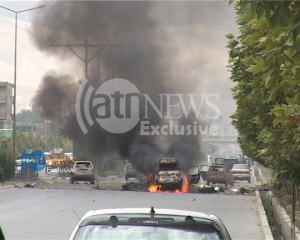Latest News
6 Suicide Attackers Including 2 Civilians Killed, 28 Injured in Parliament Attack
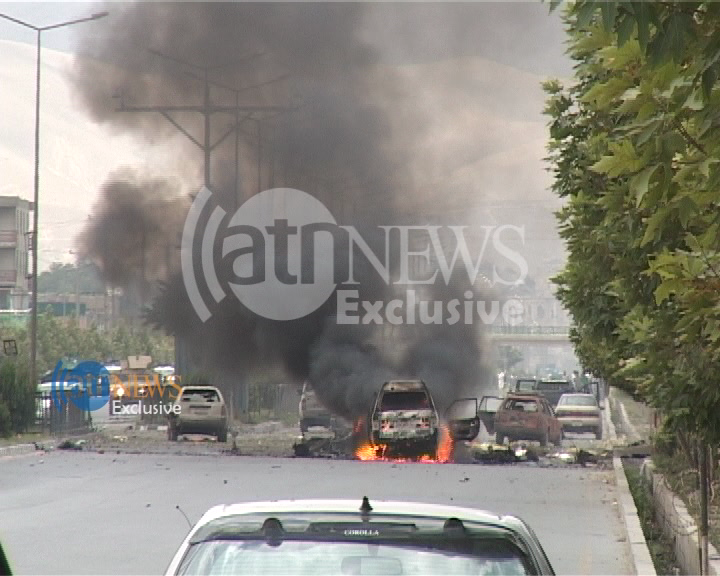
6 suicide attackers including 2 civilians were killed and 28 civilian were injured in parliament attack of Kabul city on Monday security officials said.
The following devastating suicide attack has taken place early noon where 7 armed suicide attackers fully armed to the teeth have attacked the National council of Afghanistan located in Darlaman road.
According to the eyewitnesses one suicide bomber riding a car bomb detonated his car at the entrance of the Afghan parliament, the other six attackers trying to enter the house of the parliament were killed by an Afghan National Army soldiers who has had check point at the vicinity of parliament.
Kabul police chief Gen Abdul Rahman Rahimi told to Ariana News that there were 7 attackers the first one detonated his car full explosive materials in front of the gate,while the other six attackers trying to enter the lower house of the parliament whom were killed on the spot by an Afghan National Army soldier.
Early noon attack on parliament has left financial damages to the civilian’s properties, dozens of cars on the road were burnt, glasses of the house located at the vicinity of the Afghanistan National council were broken and 28 human beings were injured.
Afghan National Army named Issah Khan from Laghman province has shot death all six suicide attackers at the gate said,” I killed all those six suicide attackers one by one you all can see their death bodies laying on the ground.”
Enemies of the religion and Islam even doesn’t respect the holy month of Ramadan.
Taliban spokesman Zabiullah Mujahid has taken the responsibility of the attack in his twitter claiming heavy casualties in the attack.
The following attack comes after that Chardara and Archi districts of Kunduz Province are being controlled by the Taliban.
Reported by Fawad Ahmadi

Latest News
Russia’s special envoy meets with IEA ministers, discusses bilateral issues
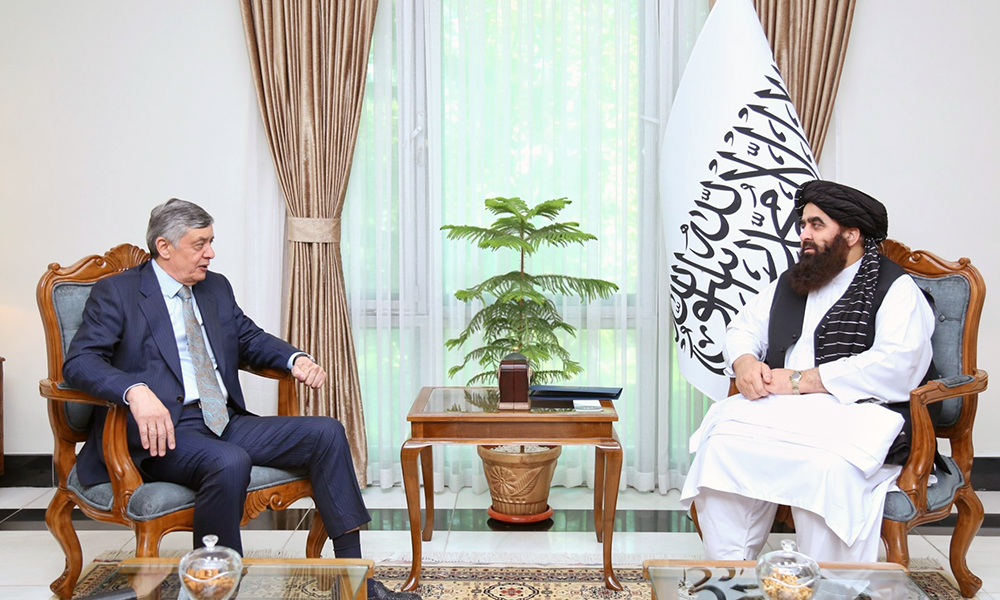
Zamir Kabulov, the Special Representative of the President of the Russian Federation for Afghanistan, who is on a visit to Kabul, has met with the Minister of Foreign Affairs of the Islamic Emirate Mawlavi Amir Khan Muttaqi for talks on political and economic issues between Afghanistan and Russia.
Regional issues were also discussed.
Muttaqi expressed appreciation for Russia’s support at regional and international meetings and emphasized the need to further strengthen political ties and trade relations between the two countries.
He also said that Afghanistan’s relations with countries in the region are flourishing and currently Afghanistan has active embassies in all neighboring countries.
Muttaqi called Afghanistan’s relations with Russia important and said the current ground realities of Afghanistan should be understood and that there is no reason why the United Nations needs to appoint a special representative to deal with Afghanistan.
He said the Afghan government is in talks with the UN over this issue and will make public its position after sufficient clarification has been provided on the agenda and composition of the next UN meeting in Doha.
Kabulov in turn stressed that any meeting held on Afghanistan should be convened with the approval of the Afghan government.
He said it is important for the United Nations to have the Afghan government approve and attend the next Doha meeting.
He said this series of meetings will not yield positive results without the Afghan government being in agreement.
He also said governments of the world should maintain relations with the Afghan government through bilateral mechanisms instead of multilateral contact mechanisms.
Kabulov emphasized that the US should release Afghanistan’s frozen assets and end its unilateral and “illegal” restrictions on the country’s banking system.
He also said Russia and Afghanistan need to improve coordination between them and went on to say he hoped Muttaqi would visit Moscow during the course of this year.
Kabulov also met with acting Minister of Interior Affairs Sirajuddin Haqqani.
This meeting focused on bilateral relations between both countries while political and security issues pertaining to the region were also discussed, the ministry said.
Latest News
Afghans in Europe Union members meet with ministers of defense, mining
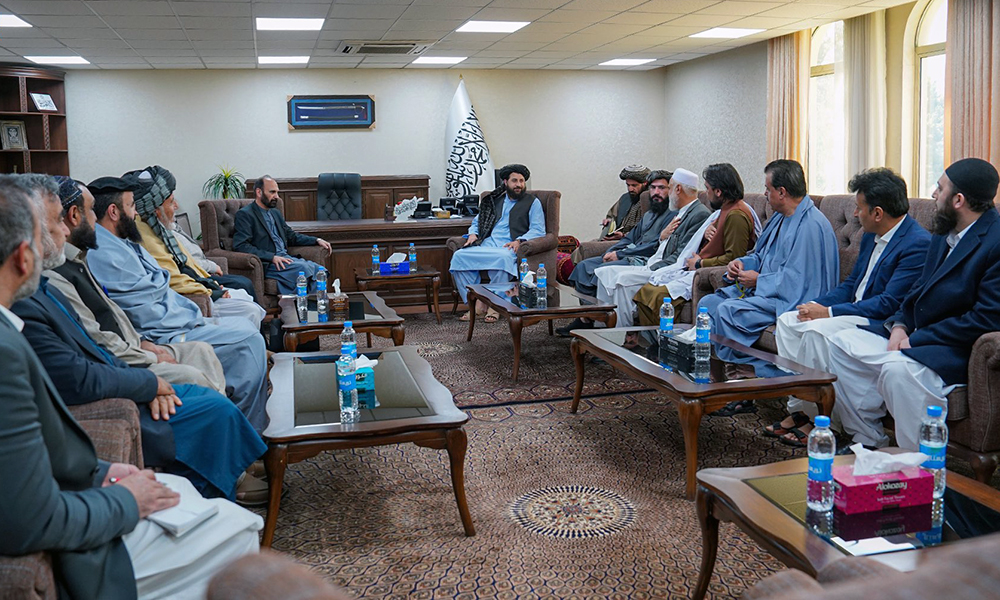
Representatives of the Union of Afghans living in Europe on Tuesday met with the ministers of defense and mining for talks on several issues.
Acting Minister of National Defense Mohammad Yaqoub Mujahid said in a meeting with union delegates that the current security situation in the country has provided an opportunity for everyone to participate in the progress of Afghanistan.
Mujahid added that there were still some problems in certain areas but that these will be removed.
In this meeting, Mujahid called Afghanistan the common home of all Afghans and said the problems in the country will be solved soon.
“The problems that exist in some issues will be solved soon; but there was nothing more than the security that has been revealed in this land today with the help of Allah and with the sacrifices of our people,” he was quoted in a statement as saying.
According to the statement, a number of Afghans, who only moved to the country after the Islamic Emirate’s takeover, expressed their satisfaction with the current situation in the country.
In addition, Shahabuddin Delawar, acting Minister of Mines and Petroleum, also met with union representatives and asked Afghans living abroad to return to Afghanistan and contribute to the country’s progress.
In this meeting, the Afghans living in Europe asked Delawar to provide better facilities to Afghans who want to invest in the country. The Ministry of Mines and Petroleum says that Delawar also asked the visiting delegation to return to Afghanistan and contribute to the country’s development.
Earlier, in a meeting with a number of other officials of the Islamic Emirate, including the political deputy of the Prime Minister and the Acting Minister of Foreign Affairs, this delegation emphasized the need to strengthen the system and provide work and education to Afghan girls and women.
Latest News
Regional developments require Afghanistan, China’s full coordination to protect interests: Muttaqi
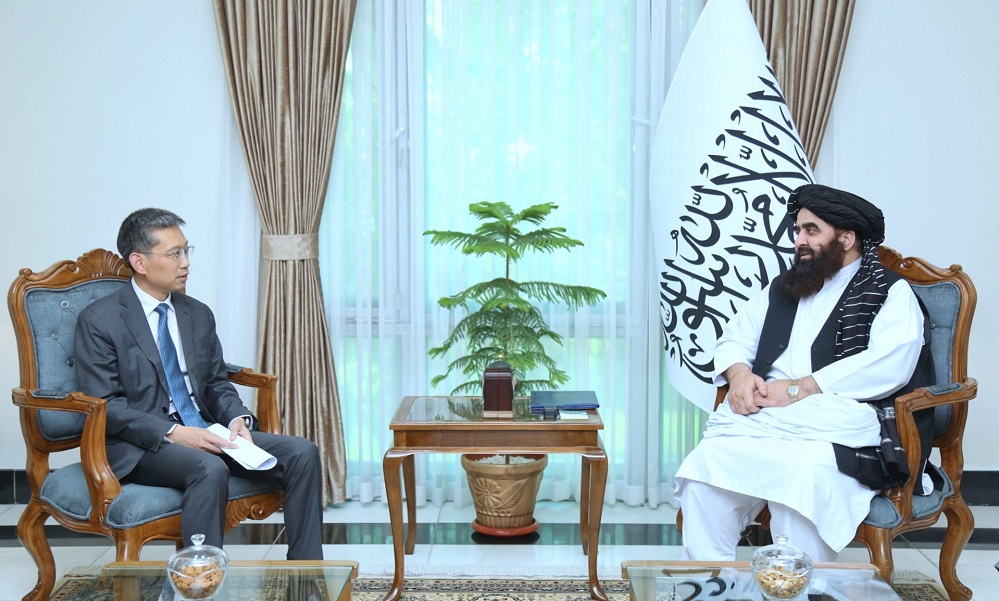
Acting Minister of Foreign Affairs Amir Khan Muttaqi has said that recent events and developments in the region require that Afghanistan and China continue their cooperation in full coordination so that they can protect their common interests.
Muttaqi stated this in a meeting with the Chinese ambassador in Kabul Zhao Xing.
The Ministry of Foreign Affairs said in a statement Tuesday that the two sides discussed bilateral political, economic and cultural cooperation between Afghanistan and China and the recent developments in the region.
Muttaqi expressed his satisfaction with the expansion of political, economic and cultural relations between the two countries and said that the Islamic Emirate has created good opportunities in the field of trade and investment.
He pointed out that the increase in the export of pine nuts to China and the progress in the Mes Aynak and Wakhan Corridor projects are clear examples of this policy of the Islamic Emirate.
According to the Ministry of Foreign Affairs’ statement, the Chinese ambassador considered the developments in various fields with Afghanistan as positive and added that he seeks to encourage Chinese businessmen and investors to play their role for long-term economic cooperation with Afghanistan.
He also said that his country is considering ways of bilateral cooperation and resources regarding Wakhan Corridor.
-

 Business5 days ago
Business5 days agoCommerce ministry inks 10 MoUs to boost development of small and medium-sized businesses
-

 Sport4 days ago
Sport4 days agoRashid Khan threatens BBL pullout after Australia postpones Afghanistan T20I series
-

 Latest News5 days ago
Latest News5 days agoOver 6,000 acres of land cleared of poppies in Badakhshan
-

 Latest News5 days ago
Latest News5 days agoMSF ‘deeply concerned’ over new phase of deportations of Afghans from Pakistan
-

 Sport3 days ago
Sport3 days agoAfghanistan Champions League kicks off with grand opening ceremony
-

 Latest News3 days ago
Latest News3 days agoPakistan’s frontiers minister stresses ‘dignified’ return of Afghan refugees
-

 Regional4 days ago
Regional4 days agoIran’s foreign minister downplays drone attack, says Tehran investigating
-

 Latest News4 days ago
Latest News4 days agoTen people killed by floods in Helmand

